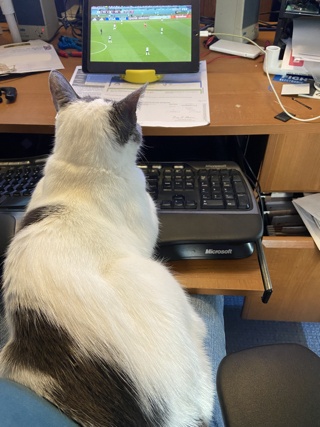Issue 91: Bibliographic Records and Mastodon Migration
Well, this newsletter was off the air longer than I anticipated. A lot has happened since issue 90 in late March: cryptocurrency value falling, Twitter spiraling (maybe a death-spiral...can't be too sure), and (in the U.S.) a whopper of a mid-term election season. All is well here in the Jester's home...I needed some time to build up some more tooling around the blog and newsletter — then summer came, and then fall, and before you knew it, eight months had passed before this issue came out.
Speaking of Twitter...I have mostly left it behind. The "DataG" account is still there, but I have turned off the automated posting and have stopped visiting the site. I've made the migration to Mastodon on the Code4Lib instance; you can find me at @dltj@code4lib.social. If you, too, have made the move, I hope you will follow me there and give me a chance to follow you back.
Threads from 12 years ago are still weaving their way through us today. In the 11th issue of Thursday Threads from 2010, I posted, among other things, about the new free e-journal hosting from University of Pittsburgh on OJS (and it looks like it is still available as a service!), the desire for open bibliographic data (and that is still a thing...see below), and the masters degree in business administration earned through a Facebook app (which, 12 years later, I would guess is no longer a thing).
I hope you and those close to you are doing well as we enter the last month of 2022. Don't be a stranger—drop me a line if you find this interesting or come across something you think I would want to know about.
- OCLC versus Clarivate: In the Battle for Bibliographic Records, the Winner is ???
- Moving On to Mastodon
Feel free to send this newsletter to others you think might be interested in the topics. If you are not already subscribed to DLTJ's Thursday Threads, visit the sign-up page. If you would like a more raw and immediate version of these types of stories, follow me on Mastodon where I post the bookmarks I save. Comments and tips, as always, are welcome.
OCLC versus Clarivate: In the Battle for Bibliographic Records, the Winner is ???
Clarivate continues to deny OCLCs allegations of wrong-doing and maintains that the issue lay between OCLC and its customers, who sought to co-create an efficient community platform for sharing of bibliographic records. Clarivate will not develop a record exchange system of MARC records that include records which OCLC has claimed are subject to its policy and contractual limitations. Clarivate will bear its own fees and costs.
Though the settlement document itself is confidential, two significant elements include: Pursuant to the confidential agreement and elements noted above, OCLC has filed a dismissal of the lawsuit.
...and with that, the case is closed. And like 12 years ago, when the Skyriver lawsuit was dismissed in much the same way, there is little clarity about the nature of the bibliographic records that run our libraries. Earlier this month I wrote a more in-depth article about the open questions from the Clarivate/OCLC lawsuit. In that post, I go through the court transcripts from the pre-settlement hearings and ask: "what was Clarivate's Metadoor" and "what is an OCLC record".
Moving On to Mastodon
As Twitter users fret over the direction that new owner Elon Musk is taking the company, masses of users have hopped over to Mastodon, an open source Twitter alternative.
That is part of the lede paragraph of an article with instructions on starting afresh in a different "digital public square". My Twitter experience has gotten notably worse over the past month; I'm at a point where I'm not finding enough value there to give Elon Musk's company any more of my attention. As I said earlier, I've resurrected my account on code4lib.social from 2018. This is kind of a vanity account now—an account with a "join date" that isn't in November 2022. I'm going to stick around there, but the thing about Mastodon and the wider "fediverse" of services that use the ActivityPub standard is that you don't need to stay in one place. You can move your Mastodon presence to another location or have more than one Mastodon presence in more than one community. (At the moment, I'm quite interested in what is going on with social.coop with its strong community governance structure and code of conduct, and I might ultimately consider that a home for the non-library-technology side of my persona.) This Mastodon thread is going to get longer in future newsletter issues, but for right now I'm pointing you to this guide to help you move from Twitter (or even Facebook!) to Mastodon...then follow me at @dltj@code4lib.social when you get there.
Alan Likes Football Too

Like many, I'm of two minds about the World Cup: I very much enjoy the skill, teamwork, and strategy on display from all over the world, but I'm against the inhumane treatment of the immigrants that built the stadiums and infrastructure, the suppression of rights in the host country, and of course the shadiness under which FIFA awarded the games to Qatar. I think that John Oliver has it right, though: enjoy the games, but don't forget—now and in the future—what led up to the games and hold those responsible to account the most effective ways that you can.